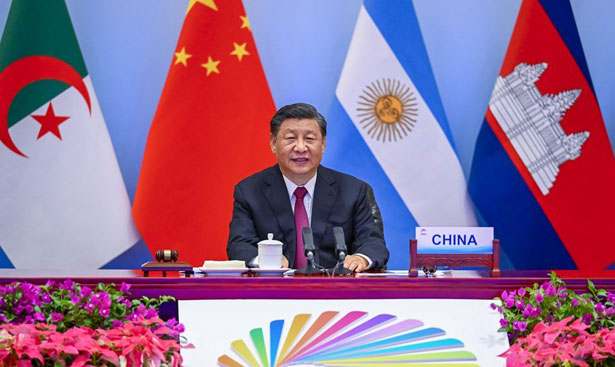By Kate O’Keeffe, Wall Street Journal, Aug. 17 (0200),
A Commerce Department-led process that reviews U.S. tech exports to China approves almost all requests and has overseen an increase in sales of some particularly important technologies, according to an analysis of trade data.
Of the U.S.’s total $125 billion in exports to China in 2020, officials required a license for less than half a percent, Commerce Department data show. Of that fraction, the agency approved 94%, or 2,652, applications for technology exports to China, the analysis showed.
For 2021, that approval rate decreased to 88%, the analysis showed, but changes in data compilation methods between the two years make comparisons difficult. The figures omit applications “returned without action,” meaning their outcomes were uncertain.
The result: The U.S. continues to send to China an array of semiconductors, aerospace components, artificial-intelligence technology and other items. Critics say such sales, which have taken place across successive U.S. administrations, could be used to advance Beijing’s military interests.
The Commerce Department says it is focused on long-term, strategic competition with China and that it makes export-control decisions with its interagency partners in the Defense, State and Energy Departments.
China, already a technological powerhouse, is developing increasingly sophisticated chips as well as other advanced technologies. Washington has responded with export controls and sanctions, and the Biden administration signed bipartisan legislation earlier this month to spend more than $50 billion to expand U.S. semiconductor manufacturing facilities in the U.S.
Critics say Commerce officials, by allowing exports of sensitive technology, are improperly giving priority to U.S. commercial interests over national security and that an urgent regulatory revamp is necessary to respond to the threat from Beijing.
For Steve Coonen, the Pentagon’s former top China export-controls analyst, the high rate of approvals for licenses to sell tech with potential military use is evidence of significant policy failure. “I have no problem trading with or feeding China,” Mr. Coonen told colleagues in a September 2021 email after resigning over frustrations with the policy. “I have a huge problem with arming China.
A Pentagon spokeswoman declined to comment on Mr. Coonen’s resignation.
The U.S. export-controls process, long a niche topic, is now at the center of a debate over how much the U.S. should continue to trade with its most powerful adversary, dozens of current and former U.S. officials said in interviews with The Wall Street Journal.
“I do believe China’s the greatest threat we face,” said Mira Ricardel, a former Trump administration Commerce official in charge of export controls.
“What we don’t have is a consensus in the U.S. government on what the relationship should be economically,” she said. “There are people who are like, ‘No, no, no, we can’t send China anything,’ but that’s not the policy,” she said, referring to technology exports.
Some warn tighter restrictions on U.S. tech sales to China will backfire because allies such as Germany, Japan and South Korea will step in to fill the void. For export restrictions to be effective, “we need our allies to have the same controls,” said Kevin Wolf, a senior Commerce official during the Obama administration who now advises companies on export regulations at law firm Akin Gump Strauss Hauer & Feld LLP, while testifying on Capitol Hill last year.
Such coordination, however, could take years, and others argue that China’s official military-civil fusion policy — which seeks to erase the distinctions between the military and the private sector — requires an immediate response, because it has made it impossible for the U.S. to guarantee tech transferred to China won’t end up in military hands.
Some question the role of the Commerce Department, the U.S.’s lead agency on the issue. Matt Pottinger, former President Donald Trump’s deputy national-security adviser, said the agency’s export-controls unit, called the Bureau of Industry and Security, “has struggled to reconcile its mission to protect U.S. national security with the Commerce Department’s objective of promoting U.S. exports. The dilemma is most acute when it comes to China.”
In late 2019, Mr. Pottinger gathered BIS officials for a special meeting in the White House Situation Room and accused them of working against administration policy on China in favor of helping U.S. businesses, according to people familiar with the matter. Mr. Pottinger acknowledged the episode, which ultimately failed to change attitudes within the unit, the people said.
Thea D. Rozman Kendler, assistant secretary of Commerce for export administration, denied the assertion. “We are promoting U.S. technological leadership. And in order to do that we need to understand U.S. technological leadership,” she said. “The best place to get that information is from industry.”
Spokespeople for the National Security Council, the Pentagon and Energy Department expressed support for the export-controls process, describing it as crucial to protecting national security. The State Department didn’t respond to requests for comment.
–Anthony DeBarros and Gordon Lubold contributed to this article




“China’s economy narrowly avoided contracting in the second quarter amid widespread lockdowns and a deepening property crisis, which have badly damaged consumer and business confidence, and COVID cases have rebounded again in recent weeks. Nomura estimates 22 cities are currently in full or partial lockdowns, making up 8.8% of GDP.”
— https://www.marketscreener.com/news/latest/Analysis-China-central-bank-under-pressure-to-ease-is-hemmed-in-by-inflation-Fed-jitters–41337336/
Please pay attention to this. It is about to affect the whole world –INCLUDING ISRAEL, INCLUDING JEWS — Ed Dowd is former asset manager for BlackRock. He KNOWS WHAT HE IS TALKING ABOUT.
EDWARD DOWD Says ‘We’re About to Enter the Meat of the Recession’ and ‘China Is Done’ in New Interview
https://sensereceptornews.com/?p=9993
Please pay attention to this. It is earth-shaking
The Chinese economic collapse is being intensified by the latest heat wave:
Besides COVID-19 and property collapses, China is now facing heatwaves and drought, which means crop failures and hydroelectricity shortages. Factories, offices and homes are facing power cuts. The picture shows a dry riverbed at Chongqing, one of China’s largest cities. GDP ???? pic.twitter.com/dqECljnCEl
— Arminius Capital (@ArminiusCapital) August 18, 2022
https://www.zerohedge.com/markets/chinas-power-crisis-worsens-more-factories-suspend-operations